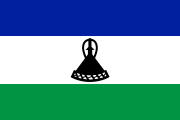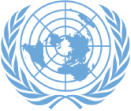
STATEMENT:
H.E. MR. PERCY M. MANGOAELA
PERMANENT REPRESENTATIVE OF THE KINGDOM OF LESOTHOTO THE UNITED NATIONS
BEFORE THE PLENARY OF THE 55TH SESSION OF THE GENERAL ASSEMBLY
ON AGENDA ITEM 13:
REPORT OF THE INTERNATIONAL COURT OF JUSTICE
OCTOBER 26, 2000 NEW YORK
Mr President,
My delegation once again welcomes the opportunity to address the General Assembly on the Report of the International Court of Justice. Permit me at the outset to extend our thanks and appreciation to the President of the Court Judge Gilbert Guillaume for his introduction of the report and for his pertinent comments. We commend him for his dedicated stewardship of the Court and for the Court's impressive achievements over the period under review. This will no doubt further enhance the international community's confidence in this unique organ of international law.
Mr President,
Lesotho remains convinced that no other judicial organ in the world can have the same capacity for dealing with international legal problems than the ICJ. As a component, not only of the machinery of peaceful settlement of disputes created by the Charter, but also of the general system for the maintenance of international peace and security, the ICJ continues to offer States a wide range of opportunities for promoting the rule of law in international relations by amongst others, "deciding in accordance with international law, such disputes as are submitted to it." Because of its achievements in finding just and equitable solutions to legal conflicts between States, the ICJ continues to enjoy universal support and respect, hence a noticeable increase in the number of cases being referred to it. This has no doubt also contributed to much of the progress in the political, social and economic arena we have witnessed in recent years.
Mr President,
The promotion of and commitment to peaceful settlement of disputes in accordance with the United Nations Charter remains one of the cornerstones of Lesotho's foreign policy goals. Like many other small and vulnerable States, Lesotho is dependent more on the law than on power in settling disputes, in defending its sovereignty, independence and territorial integrity as well as in protecting its policies in the international field. We remain keenly aware of the role that international law plays in the search for solutions to the problems of an interdependent world in which economic, social and humanitarian issues have assumed paramount importance. We recognize the important role of the ICJ as a tool for peaceful settlement of disputes and are committed to strengthening the ICJ in order to ensure justice and the rule of law in international affairs as called for in the Millennium Declaration.
The challenge for the International community at the dawn of the new century is how to strengthen the international legal order and promote effective respect for the legal norms that govern the international community. In this regard, universal acceptance of the ICJ's compulsory jurisdiction remains the best indicator of progress made towards meeting these challenges. We note that to date less than 50% of the Membership of the UN have made declarations recognizing the compulsory jurisdiction of the Court as envisaged under Article 36 of the Court's Statute.
It is thus a pleasure for me today to announce that on the occasion of the Millennium Summit on 6 September 2000, the Prime Minister of Lesotho deposited with the Secretary General, an unconditional declaration by which the Government of the Kingdom of Lesotho recognizes the compulsory jurisdiction of the ICJ in accordance with Article 36 paragraph 2 of the Statute of the Court. It is Lesotho's hope that its unconditional acceptance of the Court's jurisdiction which is yet another sign of the increasing confidence in the Court, will further enhance the Court's pre-eminent role not only as an interpreter of the legal obligations of States and in settlement of disputes, but also in the maintenance of international peace and security. It is our hope too that many more States will soon join the increasing number of countries that have recognized the compulsory jurisdiction of the Court.
Mr President,
Last year's annual review of the ICJ showed that as of July 1999, the Court was seized of 18 cases which at that time, was far more than had ever been the case within any given 12 month period. As rightly predicted, this year we have seen yet another increase, bringing the total number of cases before the Court to 23 as of July. It is our understanding that one more case has since been added to the Court's docket: the DRC against Belgium.
The current trend is thus towards an increase rather than a decrease in the Court's case load and this trend can only be expected to continue.
Another significant development with regard to the Court's activities is that unlike in the past when the jurisdiction phases of cases occupied most of the Court's time, the Court is now being frequently called upon to deal directly with a diversity of complex substantive issues of international law from all regions of the world. Given the complexity of most cases and the resource constraints faced by the Court, it is gratifying to note that during the period under review the Court finalized the Botswana and Namibia case concerning the Kesikili/Sedudu Island as well as issued various orders concerning a number of other cases.
There can however be no doubt that in spite of the Court's best efforts, it will not be possible for it to handle the ever increasing workload and to be an effective and efficient judicial means for the peaceful settlement of disputes unless it is given adequate resources. It should indeed be a source of great concern for this Assembly that the 15 judges of the Highest Court in the world have to share and rely on six legal professionals to carry out research in complicated questions of international law and to prepare studies and notes for the judges and the Registrar. It is equally disturbing that all the translation and interpretation of the Court is handled by only six professionals. These two examples, which are only the tip of the iceberg of the Court difficulties, are a clear indication of the practical difficulties faced by the Court in carrying out its functions. This lamentable state of affairs for the Court should not be allowed to continue.
Lesotho, therefore, reiterates the call for an increase in the Court's resources to enable it to fully and effectively respond to the ever increasing demands of the international community. Strengthening the Court is the only way that we can realize the dream of "the domination of law in relations amongst people."
In conclusion, Mr President, we commend the Court for its outreach programmes. Lack of awareness about the Court and its activities is no doubt part of the problem that needs to be addressed. Ensuring that there is better public education and understanding of the Court particularly amongst policy and decision makers in government, remains important. We can only encourage the Court to continue with its endeavours in this regard. We hope that the Court's schedule will allow it to visit Lesotho in the near future and look forward to welcoming the President and other members of the Court.


